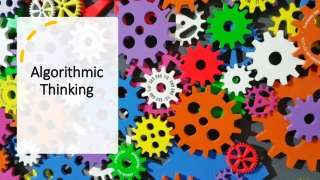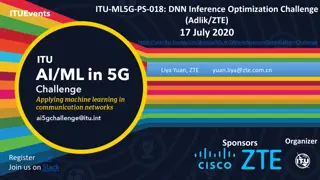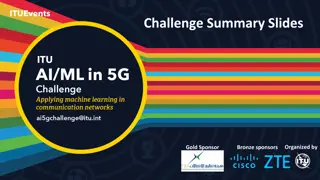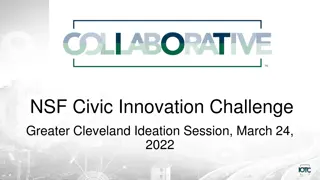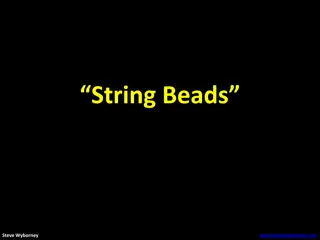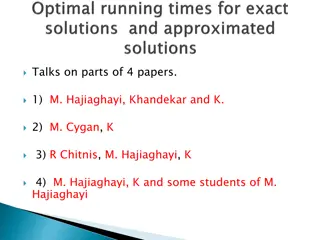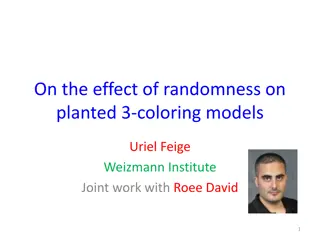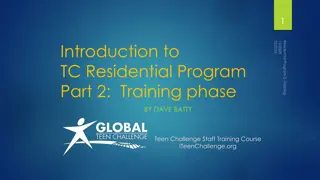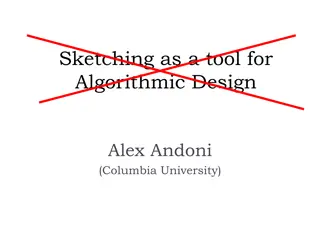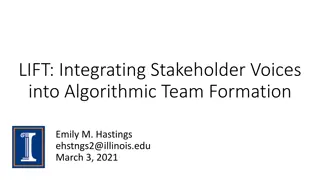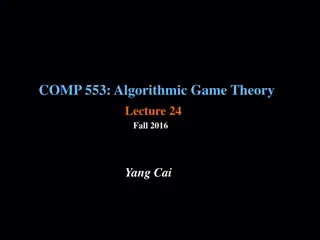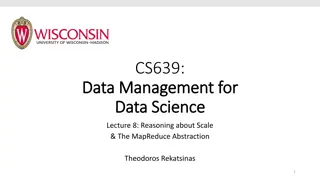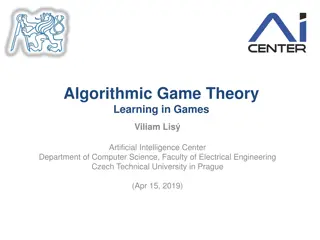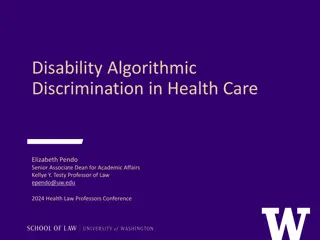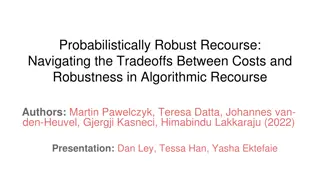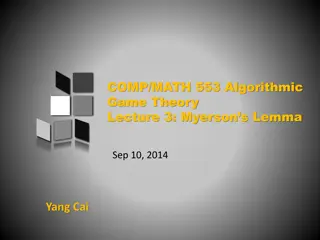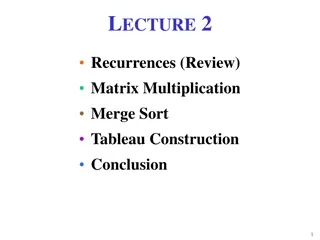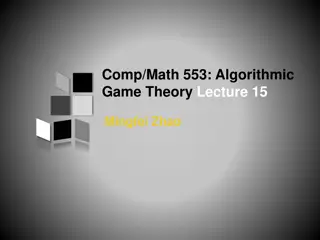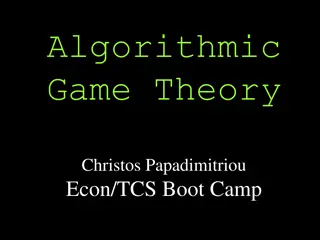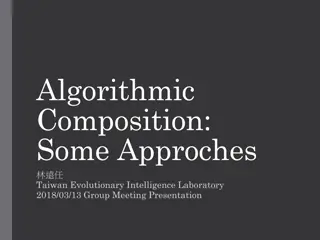Understanding Algorithmic Thinking: Key Concepts and Importance
Algorithmic thinking is a crucial skill that involves problem-solving through precisely defined instructions. This competency, applicable beyond computing, entails analyzing problems, identifying steps to solve them, and designing efficient algorithms. The importance of algorithmic thinking lies in
1 views • 13 slides
BSD Spring 2023 Challenge Summary
Participants in the BSD Spring 2023 Challenge shared feedback on the tools that were most helpful, barriers they faced, positive changes made to wellness habits, and their confidence in continuing these changes. The 4-week challenge encouraged healthier lifestyle choices, including managing stress,
0 views • 10 slides
Explore the Enterprise Challenge with The Prince's Trust
The Enterprise Challenge, organized by The Prince's Trust, is a school competition fostering entrepreneurial skills among young individuals in the UK and beyond. Participants engage in activities such as online games, business idea pitching, and mentor interactions to develop their business acumen a
0 views • 51 slides
How to achieve financial freedom in 5 years
Welcome to the Financial Freedom Challenge!\nAre you ready to take control of your financial future and unlock the door to lasting prosperity? Join us on a journey toward financial freedom like no other.\nWhat is the Financial Freedom Challenge?\nThe Financial Freedom Challenge is a transformative p
0 views • 9 slides
Rx for Romance Navigating Doctors Matrimonial Sites
Given the thorough timetables and high-stress conditions specialists frequently face, customary dating can challenge. Doctor Matrimony This guide gives important experiences into the prescribed procedures for making convincing profiles, understanding algorithmic matches, and discussing really with e
1 views • 2 slides
DNN Inference Optimization Challenge Overview
The DNN Inference Optimization Challenge, organized by Liya Yuan from ZTE, focuses on optimizing deep neural network (DNN) models for efficient inference on-device, at the edge, and in the cloud. The challenge addresses the need for high accuracy while minimizing data center consumption and inferenc
0 views • 13 slides
Super Stackers Challenge - Cup Stacking Fun and Learning Activity
Engage in the Super Stackers Challenge where teams work together to complete various cup stacking tasks using only plastic cups, rubber bands, and string. With specific design requirements for each challenge, participants must manipulate the cups using a unique apparatus. Reflect on the difficulty o
1 views • 11 slides
ITU AI/ML in 5G Challenge Overview
The ITU AI/ML in 5G Challenge organized by bronze sponsors and gold sponsors aims to revolutionize communication networks with AI. The challenge brings together industry stakeholders to innovate and solve network problems using AI/ML. Regional hosts from various countries will participate, and both
1 views • 12 slides
HotFuzz: Discovering Algorithmic Denial-of-Service Vulnerabilities
A detailed exploration of algorithmic complexity bugs and insight into distributed micro-fuzzing methods. The study uncovers vulnerabilities through guided micro-fuzzing approaches, emphasizing the importance of AC bug detection and fuzz testing techniques such as seed inputs, fuzz observations, and
0 views • 14 slides
Understanding the Right to an Explanation in GDPR and AI Decision Making
The paper delves into the necessity for Explainable AI driven by regulations such as the GDPR, which mandates explanations for algorithmic decisions. It discusses the debate surrounding the existence of a legally binding right to explanation and the complexities of accommodating algorithmic machines
0 views • 22 slides
NSF Civic Innovation Challenge - Empowering Community-driven Solutions in Greater Cleveland
The NSF Civic Innovation Challenge is a unique opportunity for community partners and researchers to collaborate on addressing pressing community challenges. The challenge, organized into two tracks, focuses on climate resilience and essential resources for communities. Learn more about this researc
1 views • 9 slides
Evolution of Algorithms and Computer Science Through History
The history of algorithms and algorithmic thinking dates back to ancient times, with the development of general-purpose computational machines by Charles Babbage in the 19th century marking a significant advancement. The term "computer science" emerged in 1959, encompassing theoretical computer scie
1 views • 39 slides
Computational Thinking, Algorithms & Programming Overview
This unit covers key concepts in computational thinking, including decomposition, abstraction, and algorithmic thinking. Decomposition involves breaking down complex problems, abstraction focuses on identifying essential elements, and algorithmic thinking is about defining clear instructions to solv
1 views • 5 slides
Esti-Mystery Challenge: How Many Beads Are on the String?
In this Esti-Mystery Challenge, you are tasked with estimating how many beads are on a string based on clues provided. Through a series of clues narrowing down possibilities, the final answer is revealed to be 29 beads in each bowl, totaling 61 beads. Test your estimation skills and enjoy the challe
0 views • 6 slides
Inexpensive Digital Azimuth Readout Challenge by Paul Wade W1GHZ
This challenge calls for creating an inexpensive digital remote readout for azimuth, particularly useful in EME and microwaves. The project involves expertise with microprocessors like PIC, Arduino, Raspberry Pi, etc. The goal is to develop a functional system, share the plans, and the parts expense
0 views • 12 slides
Understanding Algorithmic Thinking in Digital Systems
Explore the application of algorithmic thinking in digital systems through the journey of Mike Clapper, the Executive Director of AMT. Learn about recognizing patterns in data, creating algorithms to solve problems, and utilizing information systems creatively. Enhance your knowledge of digital syst
0 views • 56 slides
Insights into Advanced Algorithmic Problems
Delve into discussions surrounding complex algorithmic challenges, such as the limitations in solving the 3-SAT problem within specific time bounds, the Exponential Time Hypothesis, proving lower bounds for algorithms in various scenarios, and exploring approximation ratios in algorithm design. Thes
1 views • 65 slides
Easter Quiz Fun: Famous Faces, Easter Facts, Puzzles, and Chocolate Challenge!
Join the Easter quiz and test your knowledge with rounds featuring famous faces, Easter facts, puzzles, and a chocolate challenge. From identifying well-known personalities to learning about Easter traditions, this interactive quiz offers a fun way to celebrate the holiday. Unscramble words, solve r
0 views • 19 slides
Exploring the Impact of Randomness on Planted 3-Coloring Models
In this study by Uriel Feige and Roee David from the Weizmann Institute, the effect of randomness on planted 3-coloring models is investigated. The research delves into the NP-hard nature of 3-coloring problems, introducing a hosted coloring framework that involves choices like the host graph and th
0 views • 55 slides
Training Phase in Teen Challenge Residential Program
The training phase in the Teen Challenge residential program is a crucial period focused on developing drug-free lifestyles, deepening relationships with Jesus, and creating personal recovery and exit plans. Participants follow a structured daily schedule that includes devotions, classes, work progr
0 views • 12 slides
Wolves Hockey Summer Challenge - 212 Degree Award Program
Engage in the Wolves Hockey Summer Challenge to earn the prestigious 212 Degree Award by elevating your game one degree at a time. Participate in stickhandling, shooting, and dryland activities to accumulate points towards exciting rewards. Take part in the 10,000 Shot Club and see your name on the
0 views • 9 slides
Sketching as a Tool for Algorithmic Design by Alex Andoni - Overview
Utilizing sketching in algorithmic design, Alex Andoni from Columbia University explores methodologies such as succinct efficient algorithms, dimension reduction, sampling, metric embeddings, and more. The approach involves numerical linear algebra, similarity search, and geometric min-cost matching
0 views • 18 slides
Algorithmic Issues in Tracking: A Deep Dive into Mean Shift, EM, and Line Fitting
Delve into algorithmic challenges in tracking tasks, exploring techniques like mean shift, Expectation-Maximization (EM), and line fitting. Understand the complexities of differentiating outliers and inliers, with a focus on segregating points into best-fit line segments.
0 views • 44 slides
Understanding Greedy Algorithms in Algorithmic Design
Greedy algorithms in algorithmic design involve making the best choice at each step to tackle large, complex problems by breaking them into smaller sub-problems. While they provide efficient solutions for some problems, they may not always work, especially in scenarios like navigating one-way street
0 views • 9 slides
Enhancing Algorithmic Team Formation Through Stakeholder Engagement
Integrating stakeholder voices is crucial in algorithmic team formation to ensure a positive team experience, quality outcomes, and high performance. This research explores learner-centered approaches and considers various team formation methods, highlighting their strengths and weaknesses in educat
0 views • 37 slides
Understanding Brouwer's Fixed Point Theorem and Nash's Proof in Algorithmic Game Theory
Explore the foundational theorems of Brouwer and Nash in Algorithmic Game Theory. Dive into Brouwer's Fixed Point Theorem, showcasing the existence of fixed points in continuous functions. Delve into Nash's Proof, unveiling the Nash equilibrium in game theory. Discover visualizations and constructio
0 views • 23 slides
Understanding Scalability and Algorithmic Complexity in Data Management for Data Science
This lecture delves into the concept of scalability in data management for data science, covering operational and algorithmic aspects. It discusses the importance of efficient resource utilization, scaling out to multiple computing nodes, and managing algorithmic complexity for optimal performance i
0 views • 47 slides
Proposal for Directive to Enhance Working Conditions in Platform Work
The proposal aims to address challenges in platform work, including employment status classification and algorithmic management issues. It seeks to improve transparency, fairness, and accountability in algorithmic decision-making, correctly determine employment status, enhance transparency in platfo
0 views • 13 slides
Understanding Debugging in High-Level Languages
Debugging in high-level languages involves examining and setting values in memory, executing portions of the program, and stopping execution as needed. Different types of errors – syntactic, semantic, and algorithmic – require specific debugging approaches. Syntactic errors are related to code l
0 views • 9 slides
Algorithmic Game Theory Learning in Games by Viliam Lis
The content discusses the concept of algorithmic game theory learning in games, covering topics such as online learning, prediction, best response dynamics, and convergence to Nash equilibrium. It explores how simple learning agents achieve equilibrium outcomes and the application of algorithms in v
0 views • 23 slides
Algorithmic Discrimination in Health Care: Protecting Vulnerable Patients
Elizabeth Pendo and Jennifer D. Oliva discuss disability discrimination in health care algorithms, advocating for legal protections under Section 504, ADA, and ACA. Their article proposes strategies to combat algorithmic bias and enhance antidiscrimination efforts in the 2024 Section 1557 final rule
0 views • 13 slides
Navigating Tradeoffs in Algorithmic Recourse: A Probabilistic Approach
This paper introduces PROBE, a Probabilistically Robust Recourse framework allowing users to balance cost and robustness in algorithmic recourse. Users can choose the recourse invalidation rate, enabling more tailored and efficient recourse management compared to existing methods. PROBE enhances cos
0 views • 17 slides
KS2 Netball Challenge: Complete All 5 Challenges
Join the KS2 Netball Challenge where you'll participate in 5 engaging challenges in groups of three as a Player, Coach, and Officiate. Score points, improve your skills, and have fun while enhancing your netball abilities. Don't forget to watch the instructional videos for each challenge and follow
0 views • 16 slides
Understanding Myerson's Lemma in Algorithmic Game Theory
Myerson's Lemma is a fundamental concept in algorithmic game theory, particularly in the context of Sponsored Search Auctions. This lecture delves into the application of Myerson's Lemma to ensure truthful bidding as a dominant strategy, maximize social welfare, and maintain polynomial running time
0 views • 19 slides
Understanding Algorithmic Complexity Measures and the Master Method
In this study, we explore key concepts in algorithmic complexity, including recurrences, matrix multiplication, merge sort, and tableau construction. We delve into the Master Method for solving recurrences, examining Cases 1, 2, and 3, and providing solutions for each scenario. Additionally, we disc
0 views • 61 slides
TE Challenge Phase II Team Collaboration Meeting Overview
The TE Challenge Phase II team collaboration meeting on May 9, 2017, focused on introducing participants, discussing the Abstract Component Model, reviewing the Challenge Scenario Development Process, and setting goals for partnership and interoperability among tools. The meeting agenda included par
0 views • 24 slides
Understanding the Importance of Respectful Challenge in Safeguarding Practice
Exploring the significance of respectful challenge in safeguarding practices, this content delves into the role of challenge in promoting child-focused decision-making while navigating disagreements and conflicts among practitioners and parents/carers. It emphasizes the need for practitioners to app
0 views • 17 slides
Algorithmic Game Theory Lecture on Prophet Inequality and Auction Design
In this lecture on Algorithmic Game Theory, Mingfei Zhao discusses the Prophet Inequality and its application to single-item auctions. The lecture covers the concept of Prophet Inequality, strategies to guarantee expected payoffs, and different auction designs such as the Bulow-Klemperer Theorem and
0 views • 10 slides
Evolution of Algorithmic Game Theory in Computer Science
The evolution of Algorithmic Game Theory (AGT) in the realm of Computer Science showcases the intersection of economics and theoretical computation. Before 1995, notable researchers like von Neumann and Megiddo laid the foundation for AGT. Concepts such as computation as a game, bounded rationality,
0 views • 62 slides
Exploring Algorithmic Composition Techniques in Music Generation
Algorithmic composition involves the use of algorithms to create music, mimicking human composers by generating music based on specific rules and structures. This presentation delves into various approaches such as DeepBach, MuseGAN, and EMI, highlighting the use of evolutionary algorithms, machine
0 views • 35 slides
